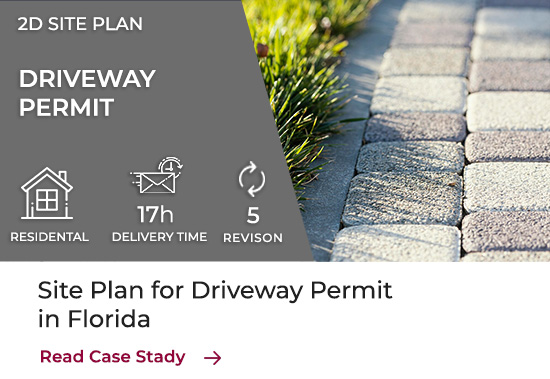
Suppose you are reorganizing your property and have decided to add a new driveway.
Before starting the project, you might be wondering if a permit is necessary for such a small task.
The answer is that it depends.
Let’s look at the factors involved.
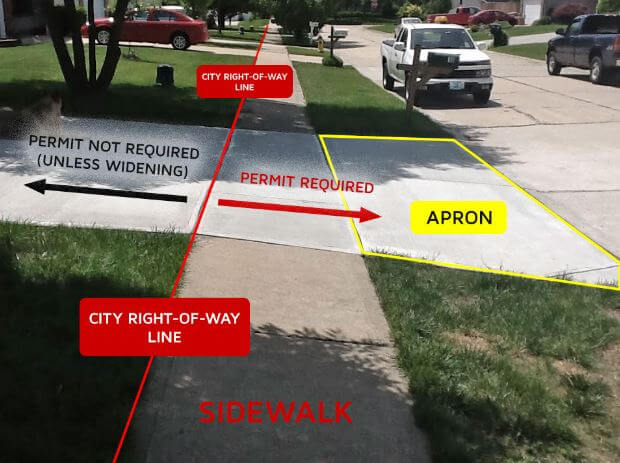
Yes, in the majority of cases, you need a driveway permit if you want to make a new driveway connection at your property.
Obtaining a permit for a driveway is also a required step when you are going through the process of getting approval for land use or a building permit.
Basically, if you are adding a new driveway that will access the public road, the driveway permit is obligatory.
The need for a driveway permit can depend on factors such as:
In some situations, depending on these and similar specificities, you will even have to obtain more than a driveway permit:
However, there are some exceptions as well:
Therefore, driveway material can also play a role, but whether you’re asking about needing a permit for an asphalt driveway, a gravel driveway, or a concrete driveway, the permit requirements can vary.
Following all of these examples, it’s advisable to contact your local building department first and find out whether a permit is necessary and what applicable standards you must meet.
Material choice may affect the driveway permit requirement, depending on local laws and building codes (this is particularly true for concrete, where separate permits might apply — learn more in our article Do You Need a Permit to Pour Concrete).
It’s usually tied to soil type, climate, potential erosion, drainage, and other specific features of the state or city.
Whether a permit is required for a gravel driveway depends on the type of gravel chosen, as regulations often aim to prevent erosion and flooding.
Gravel with a high sand and silt content enhances structural stability but sacrifices porosity, potentially requiring permits similar to those needed for concrete installations.
Yes, most likely, no matter the state or city, you’re going to need a permit for a concrete driveway.
Whether you will need permission to pour a concrete driveway again varies by city and state, but it’s often related to the height off the ground (some places restrict it to 18 inches, while others allow up to 30 inches).
Hempfield doesn’t require it, while the cities of Ocoee and Brooklyn do, as stated on their official websites [6], [7], [8].
Yes, in most cases, no matter the state or city, you need a permit for an asphalt driveway.
In some locations, like Clayton City, besides the driveway permit, you will also need a right-of-way permit considering you’re going to work on the driveway apron where it connects to the street [9].
In most locations, like the Town of Randolph, a permit is required since asphalt is an impenetrable material and therefore not environmentally friendly [10].
Whether you need a permit to pave a driveway depends on the local regulations.
In some countries, like Florida, pavers aren’t considered permanent structures, so the permit isn’t required. Yet, in some locations, like the City of Concord or the City of Lowell, the permit is required [11], [12].
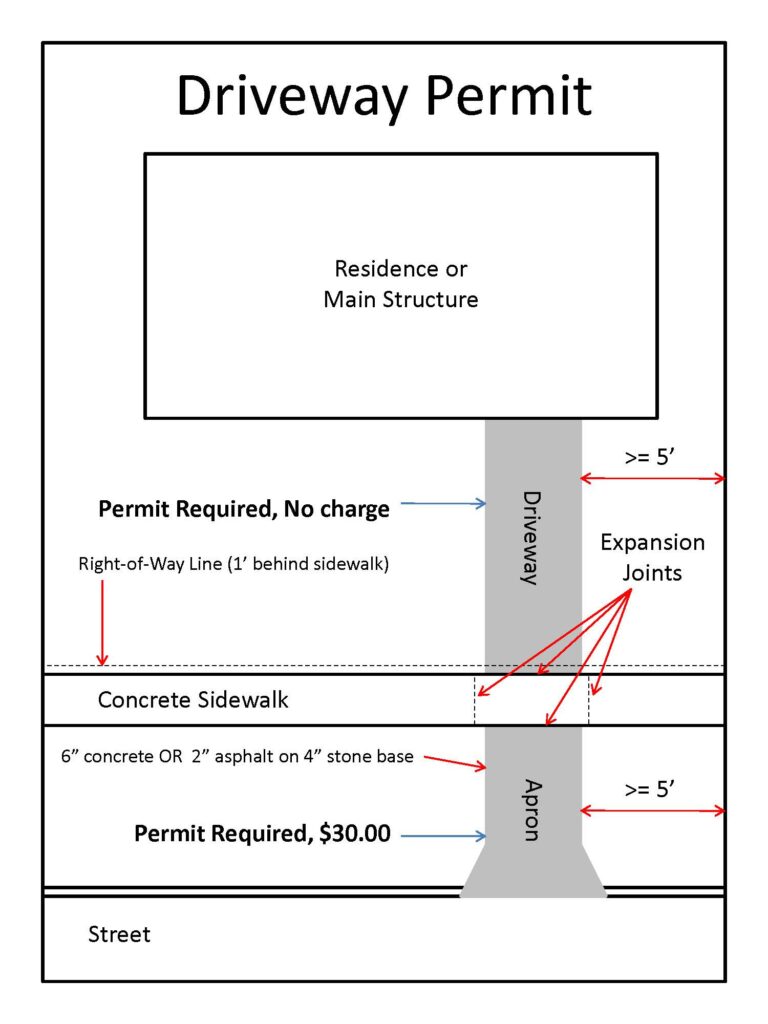
A driveway permit is necessary because constructing a driveway often involves modifying public (right-of-way) spaces, such as gutters, sidewalks, driveway approaches, or curbs.
“Driveway permit means a permit granted by the Village authorizing the construction of a driveway that provides access from a highway or from a private road or street.” – Law Insider [13]
Obtaining a permit and adhering to building codes ensures that the new driveway is safe and meets all required standards, primarily aimed at protecting residents and the community.
Permits also guarantee that contractors follow regulations related to craftsmanship and material quality, reducing the likelihood of substandard construction.
Lastly, obtaining a driveway permit helps you avoid potential fines and legal issues in the future.
Therefore, for similar reasons, a driveway permit is usually required, even if you are repaving or widening your driveway.
This is why you should factor the permit cost into the overall cost of extending driveway.
Note: Don’t confuse a driveway permit with a temporary driveway permit. A temporary permit only allows construction vehicles access to the construction site from the public road.

When you construct a driveway without a permit, you can face numerous unpleasant consequences, which vary based on local regulations and enforcement practices.
Here are some potential outcomes:
To prevent these outcomes, ensure you obtain all the required permissions, including the driveway permit and any other necessary approvals, as soon as possible.
Start with a site plan for permits, as it’s a crucial document necessary for obtaining all necessary approvals. Luckily, you can get a reliable one in online form within 24 hours.
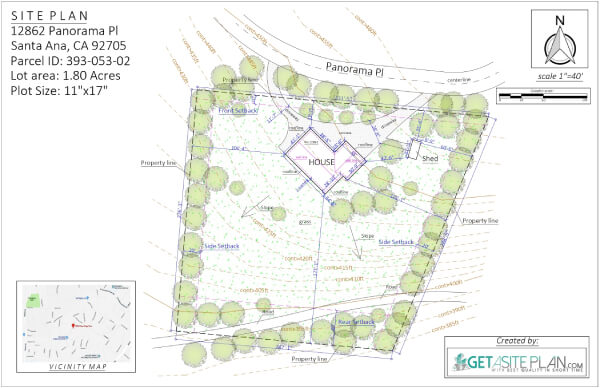
Lastly, after obtaining the permit, ensure all conditions are met and that the work is completed before the permit expires, which is usually within one year; otherwise, you will have to pay for a permit renewal.
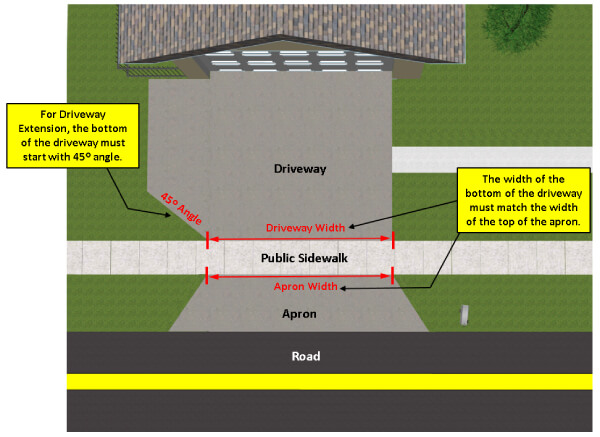
Requirements for driveway plan permissions can vary based on local regulations.
However, in general, they include the following:
As you saw earlier in the article, in some municipalities, you may need to obtain additional permits to avoid permit denial, while others may be less rigorous regarding driveway regulations.
Therefore, again, to be sure nothing is missed, always contact your local planning authorities to get the most accurate information.
If the local authorities tell you you’ve got all the required documents, you can proceed with the application process.
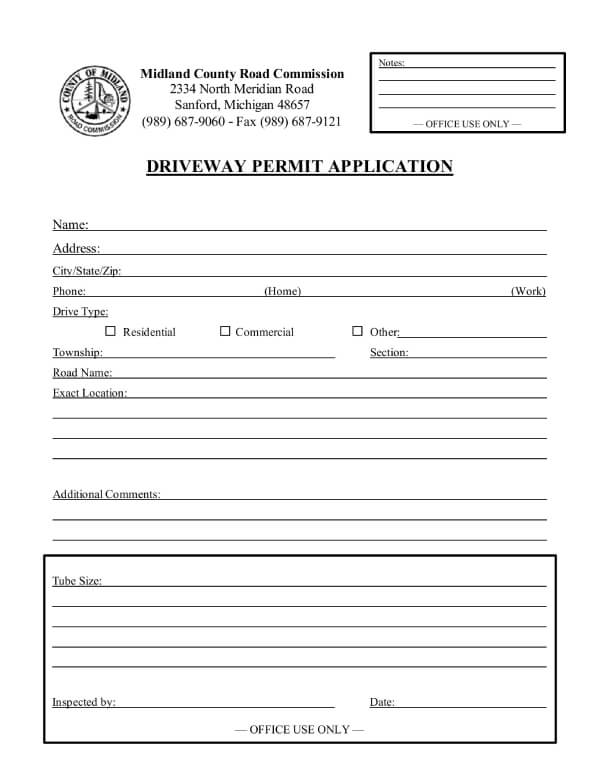
Once you have gathered all the necessary documents, you can start the application process (in the picture above, you can see a sample of an application).
Here’s how it looks:
These are the typical steps you will go through if everything proceeds without complications.
It can take anywhere from 2 days to eight weeks to review and approve your driveway permit, depending on the specific municipal codes, population, and workload.
The fees for driveway permits can vary from $50 to $200, depending on your location and the specifics of your project.
While the driveway permit is an additional factor that impacts the overall cost—whether the cost to pave a driveway, repave it, or repair it—this document is typically necessary.
Fortunately, securing a permit is straightforward if you gather the right information and required documents in a timely manner.
One essential document you will need, regardless of the municipality or project type, is a detailed site plan.
Investing in a high-quality site plan early on will streamline the permit application process, helping you avoid delays and complications.
With proper preparation and adherence to local regulations, you can confidently move forward with your driveway project.
References: